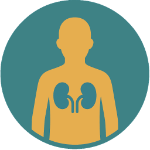Emotional Health and the Kidneys
When people think about kidney health, they often focus on diet, blood pressure, or lab results. In Traditional Chinese Medicine (TCM), however, emotions play just as important a role. The kidneys are linked with the emotion of fear, and long-term emotional strain can weaken their energy just as much as physical stress. For people with Chronic Kidney Disease (CKD), learning to support emotional balance is an important part of self-care and overall well-being.
Emotional Care for the Kidneys
- Practice breathing or meditation to reduce fear
- Use qigong or taijiquan to calm the mind and body
- Maintain routines of stillness and reflection
- Seek support from friends, family, or community
- Spend time in nature to strengthen calmness and resilience
In TCM theory, each organ system is connected with particular emotions. The liver is tied to anger, the lungs to grief, the heart to joy, and the kidneys to fear. When emotions are experienced in balance, they flow naturally and even support health. But when fear or insecurity is excessive or constant, the kidneys may become depleted, leading to fatigue, poor sleep, or a sense of instability. Conversely, weak kidneys may make a person more prone to anxiety or nervousness, creating a cycle that can be difficult to break.
Western medicine also recognizes the connection between stress and kidney health. Chronic stress activates hormones that raise blood pressure and strain the cardiovascular system, both of which can worsen CKD. Emotional distress can also make it harder for patients to stick with healthy routines, such as following dietary guidelines, getting enough rest, or taking medications regularly. In this way, emotional health directly influences physical outcomes.
Practical methods for calming the mind are widely used in TCM. Breathing exercises, meditation, and qigong are common ways to release fear and cultivate steadiness. Gentle movements such as standing meditation or slow taijiquan forms not only relax the body but also encourage grounding and confidence. Creating routines of stillness—whether through journaling, prayer, or quiet reflection—gives the kidneys space to recover.
Support from family, friends, and community is another form of medicine. Sharing feelings reduces the burden of fear, and social connection helps replenish the willpower that the kidneys are said to govern. Even simple daily practices, like spending time in nature, can shift the mind toward calm and provide strength in difficult times.
For people living with CKD, attending to emotional health is not a luxury, but part of the healing path. By nurturing calmness, reducing fear, and strengthening the will, it is possible to protect the kidneys and improve both quality of life and resilience in the face of illness.
Vocabulary Guide
- Fear (恐) – The primary emotion associated with the kidneys in TCM, which when excessive can weaken energy.
- Willpower (志) – The quality governed by the kidneys, giving strength, perseverance, and determination.
- Qigong (气功) – Breathing and movement practices that calm the mind and cultivate energy.
- Taijiquan (太极拳) – A traditional martial art and health practice, valued for gentle movement and mental balance.



